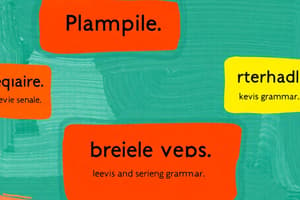Podcast
Questions and Answers
Which of the following statements accurately describes the simple past tense?
Which of the following statements accurately describes the simple past tense?
- Linking verbs never change their form in the simple past tense.
- Irregular verbs always take the same form as the base verb.
- All verbs change their form when used in the simple past tense.
- It is formed by adding a regular -ed ending to the base form of the verb. (correct)
What is the simple past tense form of the verb 'go'?
What is the simple past tense form of the verb 'go'?
- went (correct)
- goeded
- gone
- goed
Which of the following verbs is a linking verb?
Which of the following verbs is a linking verb?
- laugh (correct)
- speak
- eat
- go
In the sentence 'She laughed because she was happy,' what is the simple past tense form of the verb 'laugh'?
In the sentence 'She laughed because she was happy,' what is the simple past tense form of the verb 'laugh'?
Which step is NOT part of the process for evaluating the simple past tense?
Which step is NOT part of the process for evaluating the simple past tense?
In the sentence 'He spoke to his friends after lunch,' what is the simple past tense form of the verb 'speak'?
In the sentence 'He spoke to his friends after lunch,' what is the simple past tense form of the verb 'speak'?
Which of the following verbs does NOT follow the standard pattern of adding '-ed' to form the simple past tense?
Which of the following verbs does NOT follow the standard pattern of adding '-ed' to form the simple past tense?
In the sentence 'She $\underline{\ \ \ \ \ \ \ \ \ \ \ \ }$ because she was happy,' what is the simple past tense form of the verb 'laugh'?
In the sentence 'She $\underline{\ \ \ \ \ \ \ \ \ \ \ \ }$ because she was happy,' what is the simple past tense form of the verb 'laugh'?
Which of the following verbs has an irregular simple past tense form?
Which of the following verbs has an irregular simple past tense form?
In the sentence 'He $\underline{\ \ \ \ \ \ \ \ \ \ \ \ }$ to his friends after lunch,' what is the simple past tense form of the verb 'speak'?
In the sentence 'He $\underline{\ \ \ \ \ \ \ \ \ \ \ \ }$ to his friends after lunch,' what is the simple past tense form of the verb 'speak'?
Which of the following verbs has a simple past tense form that does not follow the standard '-ed' pattern?
Which of the following verbs has a simple past tense form that does not follow the standard '-ed' pattern?
Flashcards are hidden until you start studying
Study Notes
Evaluating Simple Past Tense
The simple past tense is formed by adding a regular -ed ending to the base form of the verb. Some irregular verbs have different endings. For example, the verb "go" changes to "went," while the verb "eat" changes to "ate." It's important to note that some verbs do not change their form when used in the simple past tense. These are called linking verbs.
To evaluate the simple past tense, we can follow these steps:
- Identify the main verb in each sentence.
- Check if it changes in the simple past tense.
- If the verb does change its form, identify how it changes.
- If the verb doesn't change its form, categorize it as a linking verb.
Let's look at some examples:
Example 1: The children went to the park yesterday.
In this example, the verb "went" represents the simple past tense of the irregular verb "go." Since "go" changes to "went" in the simple past tense, the sentence is correct.
Example 2: I ate breakfast before school.
Here, the verb "ate" represents the simple past tense of the irregular verb "eat." As expected, "eat" changes to "ate" in the simple past tense, so the sentence is correct.
Example 3: She laughed because she was happy.
In this example, the verb "laughed" represents the simple past tense of the linking verb "laugh." Linking verbs don't typically change their form when used in the simple past tense, which is why "laugh" becomes "laughed."
Example 4: He spoke to his friends after lunch.
Here, the verb "spoke" represents the simple past tense of the regular verb "speak." Since regular verbs add -ed to the base form to form the simple past tense, the sentence is correct.
Example 5: They walked to the store.
In this example, the verb "walked" represents the simple past tense of the regular verb "walk." The sentence is correct because the verb changes its form as expected.
Example 6: We ate dinner at 7 pm.
Here, the verb "ate" represents the simple past tense of the irregular verb "eat." As with the previous examples, the sentence is correct because the verb changes its form as expected.
By following these steps and correctly identifying the verbs and their changes in the simple past tense, we can evaluate the usage of the simple past tense in a sentence.
Studying That Suits You
Use AI to generate personalized quizzes and flashcards to suit your learning preferences.




